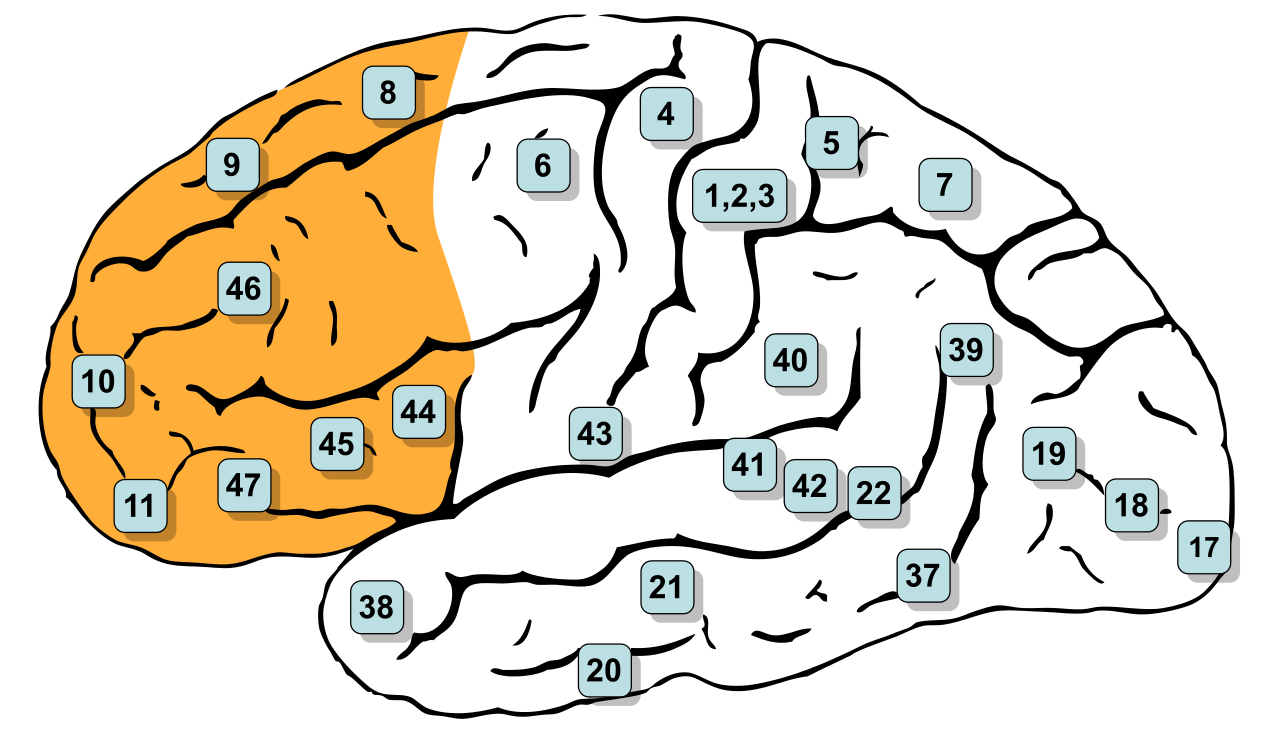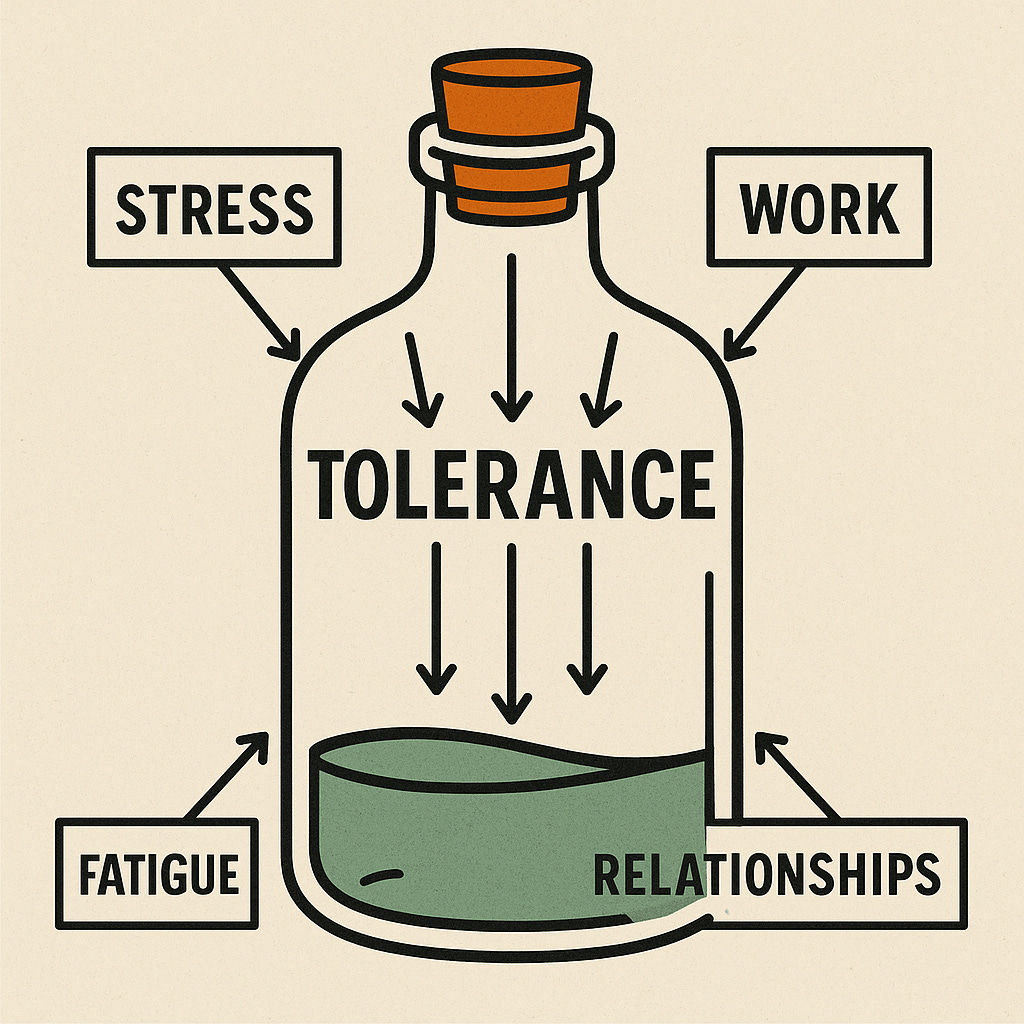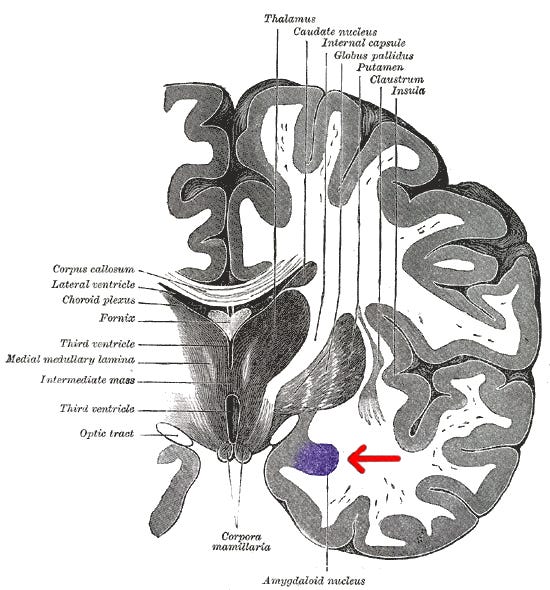The Tolerance Bottle
All about the brain science behind emotional regulation, why identical situations trigger different reactions, and practical ways to refill your bottle before it runs dry
Think back to a moment when something trivial sent you over the edge, or when the same situation that made you laugh one day, makes you want to smash something on a different day. Today, I’d like to introduce you to a concept which I use to explain what causes us to react so differently in nearly identical situations.
—
Estimated reading time: ~10 mins
I refer to this concept as the “tolerance bottle” and to my knowledge, this term hasn’t been used to frame such a concept elsewhere1.
Fair warning: this post has nothing to do with watches, so feel free to stop reading now if you aren’t interested in discussing mental health.
The idea was born in August 2024, when I was talking to a dear friend about waking up feeling overwhelmed by the tiniest things, and I felt a desire to label and address what I was feeling.
The basic concept is that everyone carries this metaphorical tolerance bottle around. On some days it’s brimming over, and on other days you’re scraping the dregs. The tricky bit is that most of us don’t realise we’re attempting to draw from an empty vessel until we’ve already lost our temper, snapped at someone we love, or made a decision we’ll spend the next week regretting.
I’ve been meaning to write about this for over a year, but after I had initially gathered my thoughts on the subject, I decided to ruminate on them a bit more; to live with this concept and see how it survives real-world testing in my own life.
This post is the end result.
—
You might be wondering why this is on a watch enthusiasts’ blog, but to be honest, this blog is about much more than watches to me. Interest in human psychology is how this blog originated, and I think this fits neatly into that category. And even if it’s not directly discussing watches, if this post benefits even one person to become a better human, better parent, better partner, or better collector-friend, then I’d call it a win.
Spilled milk
Let’s start with a basic example: your kid knocks over their milk at breakfast. On a good day, you will have slept well, work is going swimmingly, your relationship feels solid, and you’ve just had a great workout. As a result, you just smile and acknowledge it was an accident. You turn the incident into a teaching moment, and show them saint-like patience while you help clean up the mess. You might even joke with them about it. Clearly, your tolerance bottle is full, and this tiny inconvenience barely uses a drop from the bottle.
Now flip the script, and imagine it’s a Friday. You’ve just had the week from hell, and everything that could go wrong, did go wrong this week. Two team members have called in sick (and you know they’re pulling a fast one, but you can’t prove it). You’ve got a close-of-play deadline looming, and you also fought with your partner last night. That’s not all; you slept terribly because of the fight and then woke up with a backache, and then you skipped the gym because of the pain.
Now, your kid has spills the milk all over their uniform when you actually needed to leave for school five minutes ago.
Clearly, the milk itself is the same i.e. the volume of liquid is identical, and the repercussions have not changed. But your response is “understandably” different. The truth is that your tolerance bottle was empty before breakfast even started.
Wisdom to know the difference
You may not know the name Reinhold Niebuhr, but you’ve almost certainly read or heard his words before:
God, give us the serenity to accept what cannot be changed;
Give us the courage to change what should be changed;
Give us the wisdom to distinguish one from the other.Prayer said to have been first published in 1951; Richard Wightman Fox Reinhold Niebuhr (1985)
Easy to understand, but insanely difficult to put into practice.
When your tolerance bottle is full, this prayer makes perfect sense. You can clearly see what you control and what you don’t; you can accept the traffic jam, tackle the difficult conversation, and easily distinguish between the two without breaking a sweat.
What happens when you’re running on fumes, is that this wisdom tends to evaporate first. Everything feels urgent, everything feels personal, and everything feels like it demands an immediate reaction. You lose the ability to distinguish between what deserves your energy and what deserves your acceptance.
Brain science
This wouldn’t be an SDC post without some scientific backing, and in this case, we’ll start with your prefrontal cortex. This is the bit of your brain responsible for rational thinking, decision-making, and emotional regulation. This area is essentially running on a battery. When you’re well-rested, well-fed, and relatively stress-free, that battery is fully-charged. You can think clearly, pause before reacting, and use that battery power to choose a response, rather than defaulting to your primitive instincts.

Of course, it’s a battery, and batteries drain throughout the day. Every decision you make tends to deplete it a tiny bit, and every stressful interaction takes a larger chunk out of its charge. Every time you resist a temptation or bite your tongue, you’re also drawing from that finite resource. Psychologists call this decision fatigue or ego depletion, and this is why you’re far more likely to snap at someone in the evening than in the morning.
The prefrontal cortex is the first part of your brain to go offline when you’re stressed, tired, or overwhelmed. When that happens, your amygdala takes over. That’s your brain’s alarm system, and this is the bit which triggers fight-or-flight responses. It’s well-suited for survival, but terrible for measured, thoughtful reactions to your kid spilling milk or your colleague making a mistake on a critical deliverable.
So, when your tolerance bottle is empty, you’re literally operating with a different brain. The rational, patient, wise part of you has clocked out, and the reactive, survival-focused, threat-detecting part has taken full control. You’re not necessarily “weak” for losing your temper, you’re just running on empty with your primitive brain at the wheel.
Cumulative problems
The tolerance bottle doesn’t just drain from big things. Sure, a death in the family, a car accident, or a broken boiler will smash through your reserves, but what I have learned is that it’s often the accumulation of smaller things that is most likely to catch you off guard.
As it happens, you might actually handle each individual stressor reasonably well. Dealing with a difficult client might actually be totally fine. Waking up to find your microwave is not working might be annoying, but definitely manageable. Having an argument with your business partner about who will deliver a presentation might be heated, but, whatever! It passes.
Now, stack them all up in the same week, or on the same day, then add some poor sleep and a looming deadline… that’s right, you’re suddenly losing your mind about something silly, like milk!
The human brain wasn’t designed to handle the relentless barrage of decisions, stimuli, and stressors that modern life now throws at us. Our evolutionary ancestors might have faced real threats from time to time; maybe a sabre-toothed tiger, a rival tribe, or a harsh winter. But they never had to deal with push email, juggling childcare logistics, worrying about mortgage payments, navigating office politics, and trying to maintain a social life all at the same time.
How to fill your bottle
So if we agree that everyone has a finite tolerance bottle, and modern life is determined to drain it, what can you actually do about it?
I have realised that sleep is the first non-negotiable. Your brain literally cleans itself while you sleep2 - this is when it flushes out toxins, consolidates memories, and resets your emotional regulation systems. One bad night might leave you a bit foggy, but if you string together several bad nights, your tolerance bottle is bound to be half-empty before you even start your day.
Physical movement also matters more than you might realise. Exercise is widely appreciated for its fitness benefits, but one of the primary benefits I feel personally is how exercise regulates the nervous system. Exercise processes stress hormones, and gives your prefrontal cortex a break as soon as your body does something simple and rhythmic. I am not saying you need to run marathons either; a brisk walk around the block when you’re feeling overwhelmed, can also be useful reset your system.
As a regular practitioner of intermittent fasting, I came to learn about this the hard way, but the truth is, when your glucose drops, your brain goes into threat mode, making everything feel more difficult. Naturally, everyone feels more annoying when you’re in this state. Have you ever heard the term “hangry”? Well that’s not mental weakness at all, it’s just biology; your brain is literally running out of fuel and it is therefore unable to process things as rationally as it usually can.
Perhaps this goes without saying, but connection with people who “fill you up” rather than drain you is important too. Some relationships top up your tolerance bottle, and others drain it. You probably know which is which, so try and spend more time with the former.
Lastly, saying no is a wonderful skill. Try and say no to things that don’t matter. Every commitment you make is typically a withdrawal from your tolerance bottle. You really can’t do everything, and you certainly can’t please everyone. Pretending you can, just means you’ll eventually snap at someone who didn’t deserve it.
Guard rails
Real-life is not predictable, and so you can’t always keep your tolerance bottle full. Life happens, crises occur, and the truth is, some weeks are just objectively sh1t! What you can do, is develop awareness of your current state and set up guard rails before you step into situations that might push you over your limit.
Red flags in your own head work like an early warning system. Try and be proactive about noticing when you’re likely running on empty; this includes times when you’ve slept poorly, when you’re stressed about money, or when you’ve many deadlines converging. During these times, as long as you’re aware of it, you can take steps to protect yourself and others from your depleted state.
For example, you could warn your partner: “I’m really struggling today, so if I seem distant, it’s not about you”. Then keep your distance. Another example might be rescheduling a particular difficult conversation for when you’re in a better place to handle it. As for protecting your home life, I once wrote about The Problem Tree which I think is a perfect approach, even today.
The crucial bit here, is the concept of self-awareness. You can’t always control what happens to you, and you can’t always control how full your tolerance bottle is; what you can control is whether you’re aware of its current level. That awareness is what will give you the choice to pause, to breathe, and to recognise that you’re not operating at full capacity - then you can adjust your expectations of yourself accordingly.
The wisdom to know the difference
With that, we come back to that prayer we started with; the serenity to accept what you cannot change, the courage to change what you can, and the wisdom to know the difference.
The wisdom aspect begins with knowing yourself. You’ve got to get better at knowing your current state, and knowing when your tolerance bottle is running low. Once you figure that out, you can accept that you’re not going to be your best self that day, and still have a decent day. You can change what you can; maybe get an early night, delegate a task, and yes, ask for help.
Your tolerance bottle is never infinite, and that’s because you’re human; not a monk who has transcended all earthly frustrations.
One day, when you find yourself staring down the barrel of a really tough day, and when the milk spills and you fell like losing it, you might pause just long enough to recognise that it’s not about the milk. It was never about the milk. It’s about the empty bottle you’ve been running on all week.
That pause, that moment of recognition, might not fill your tolerance bottle… but it might just prevent you from emptying what little remains in a way you’ll spend even longer apologising for.
On that day, that’s probably the wisest thing you will do, and I hope you come back and thank me for it someday 😊
Not saying this is a new concept altogether, of course it isn’t! This is something which resonates with me, and how I process this stuff.
Q. I’ve heard that toxins are flushed out of the brain during sleep. Is that true?
A. One of the most interesting discoveries in the past decade is that the brain has a “waste management system.” Like people, in order to have the energy to do their work, brain cells need to eat (to absorb, primarily, sugar and oxygen). And, as in people, meals lead to wastes that need to be disposed of. The waste management system (called the glymphatic system) is a series of tubes that carry fresh fluid into the brain, mix the fresh fluid with the waste-filled fluid that surrounds the brain cells, and then flush the mix out of the brain and into the blood. This occurs primarily during deep sleep.






Always up for a non-watch read that's been thought through.
Reminds me a bit of spoon theory https://en.wikipedia.org/wiki/Spoon_theory
which I think is a terrible metaphor but can be useful when trying to understand a neurodivergent person's challenges with energy management. (A task which needs 3 spoons from me is only 1 from you, and vice versa, and somedays we didn't rest and have fewer spoons available.)
Struggling with this for a long time, will be working on it till my last days. Each year I hope to be a little better than the last.